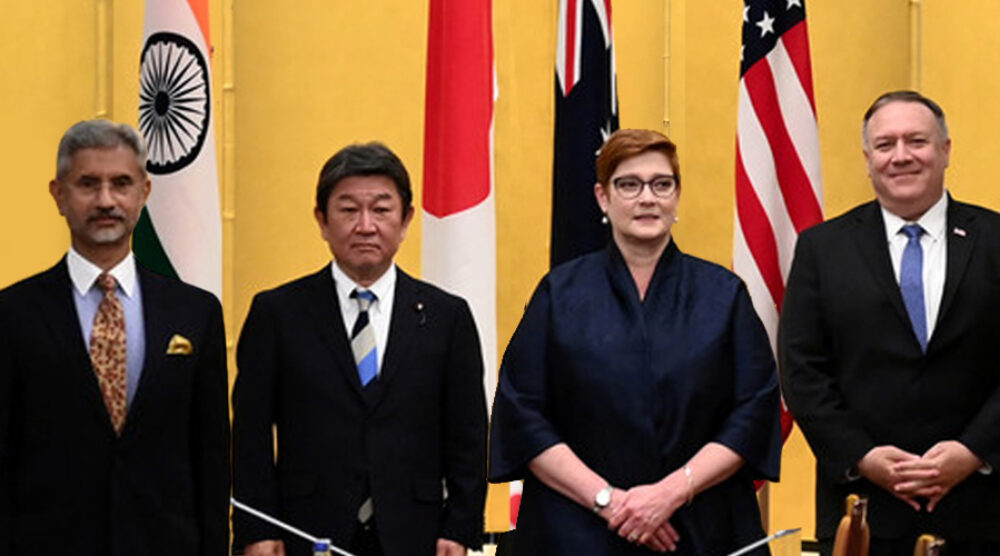What a relief it must have been for Australia’s Foreign Minister, Marise Payne to step on a plane earlier this week. Having been grounded for much of the past six months, (her only other trip being to the United States in July) she flew out to Tokyo to take part in the meeting of ‘Quad’ (Quadrilateral Security Dialogue) foreign ministers.
A significant diplomatic trip in a year where most diplomacy has taken place through virtual means.
Hosted by Japanese Foreign Minister Motegi, the Tokyo meeting provided Payne with the opportunity to pay respects to Japan’s recently appointed Prime Minister Suga and enabled important bilateral interactions with counterparts, including India’s Foreign Minister Jaishankar and US Secretary of State Pompeo. A 2-day stop-off in Singapore to meet with Prime Minister Lee Hsien Loong and Foreign Minister Vivian Balakrishnan on the way home rounded the trip out nicely.
But the Quad meeting is the main event.
It’s only the second time Quad foreign ministers have come together. Last time they met, on the sidelines of UNGA in New York in September 2019, COVID-19 was little more than a hypothetical. Just over a year later, the devastating health and economic impacts of the virus have turned the world on its head.
As an unofficial grouping of “likeminded democracies” the Quad agenda is, more than ever, focused on areas of practical cooperation. As usual these include maritime security, regional infrastructure programs and humanitarian assistance. More importantly this year they extend to issues of health cooperation, including vaccine development distribution, supply chain reliability and access to critical minerals and technology.
Payne’s opening message, referring to the Quad as “a diplomatic network with a positive agenda” to support shared interests in maintaining the primacy of rules, individual rights and international law, reinforced the broader agenda. With reference to neighbourhoods closer to home, she pointed to the importance of Australia working closely with ASEAN while stepping up efforts with the Pacific to deliver on regional recovery efforts.
Though not officially a focus of the talks, China cast a long shadow over the agenda. For all four nations, bilateral relations with China have deteriorated over the past year, and ongoing concerns about China’s increasing belligerence in diplomatic and security domains loom large.
Pompeo put China front and centre of the Quad agenda. Characteristically confrontational, he used his opening statement to call Quad partners to “collaborate to protect our people and partners from the CCP’s exploitation, corruption and coercion”. Unsurprisingly Motegi, Jaishankar and Payne were at pains to distance themselves from Pompeo’s call to action. And its unlikely to have helped his case to formalise the Quad dialogue.
At the end of the day, the question remains: will Payne’s 2-day trip to Tokyo be worth the 14-days of isolation required on return? On balance, it probably is.
The Quad is a key diplomatic mechanism. And though not the only such mechanism, it brings strategic heft to Australia’s diplomatic influence, with potential to drive momentum in other forums. The foreign ministers’ meeting offered an important sign that the Quad continues to evolve, and a much-needed nod to the ongoing value of high-level, in-person diplomacy in the region. (Zoom may well have its advantages, but when it comes to staying relevant, there’s nothing like being present and talking face-to-face).
Importantly too, the opportunities at a bilateral level are not to be discounted. News that Payne and Motegi agreed to start talks about easing travel restrictions is a welcome case in point. In addition to Quad foreign ministers, Payne as Minister for Women, met with her other counterpart, Hashimoto Seiko, Japan’s Minister for the Olympics, Paralympics, Women’s Empowerment and Gender Equality. Together they reinforced a shared commitment to prioritise women in COVID-19 recovery plans. And outcomes from Singapore are likely to be positive, particularly in advancing cooperation with ASEAN nations.
On the other hand, it’s ironic that Payne was probably the only Australian minister out of the country on budget night; a notoriously unhappy occasion for the foreign affairs portfolio. This year was no exception.
While certain specific funding allocations were identified for DFAT, overall, it’s clear that the portfolio budget continues on its downward trajectory (the result for Australian women was similarly underwhelming). As Alex Oliver and others point out, there’s not much in the way of new funding. And what new funding there is, appears to reflect political priorities while ultimately ‘skimping’ on core business of diplomacy. It reflects a difficult reality in an otherwise productive week for Australian diplomacy.
Professor Caitlin Byrne is Director of the Griffith Asia Institute.








